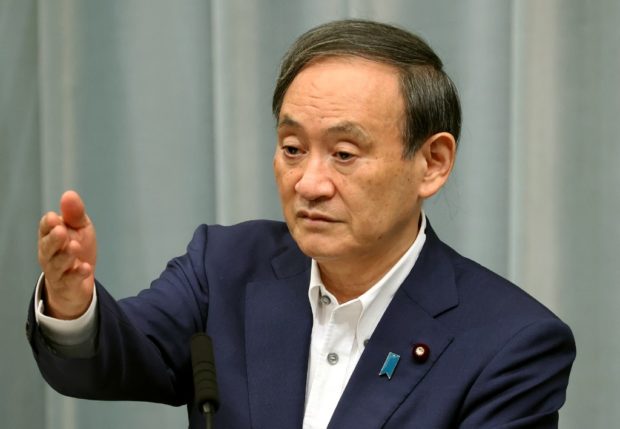
Japan’s chief cabinet secretary Yoshihide Suga attends a press conference at the prime minister’s office in Tokyo on September 1, 2020. Japan’s chief cabinet secretary Yoshihide Suga cemented his status as the clear frontrunner in the race to become the country’s next prime minister, ahead of a vote expected on September 14. Photo by STR / JIJI PRESS / AFP
TOKYO — Outgoing Japanese Prime Minister Shinzo Abe’s trusty lieutenant, top government spokesman Yoshihide Suga, has emerged as the front runner in a race to take charge of the world’s third-largest economy.
This is despite former defense minister Shigeru Ishiba being by far the public’s preferred pick, according to two weekend media surveys.
While Mr Suga, 71, has long denied harboring any ambitions for the top job, his entry into the race – set to be confirmed as soon as today – has been described by domestic media as a “seismic shift”.
There is no clear heir apparent to Mr Abe, 65, who abruptly resigned last Friday over a flare-up of a chronic condition as his public approval ratings nosedived.
But Mr Suga is seen by the top brass in the ruling Liberal Democratic Party (LDP) as the ideal continuity candidate: a stable pair of hands to continue Mr Abe’s work and potentially a unifying figure among rival factions.
He is Japan’s longest-serving Chief Cabinet Secretary, having been in the role since Mr Abe’s election in December 2012, and has been a rare constant through six Cabinet reshuffles.
But although he is the face of the government, he appears less popular among the public. The moniker “Uncle Reiwa”, given for unveiling Japan’s imperial name last year, has not struck a chord as the public sees him as stern and no-nonsense.
The LDP’s next president will be chosen in a scaled-down party vote on Sept 14, local media said yesterday, though some party members are lobbying for a full vote. The Diet, as Japan’s parliamentary body is known, will convene on Sept 17 to officially name the new prime minister. As the LDP has a majority in the Diet, the party leader traditionally becomes prime minister.
The LDP president’s post typically carries a tenure of three years, but the winner this time will only see out the remainder of Mr Abe’s term, which ends in September next year.
The election process is to be confirmed today, but it is likely that the new leader will be chosen by just 535 people – the LDP’s 394 Diet members and three representatives from each of the 47 prefectural party chapters.
This will hugely disadvantage Mr Ishiba, 63, who has cast himself as an empathetic everyday man with his constant criticisms of Mr Abe’s policies and cronyism scandals.
The native of Japan’s least-populated prefecture Tottori is popular among rural grassroots members, but less so among those LDP members keen to toe the party line.
He is also rated highly by the public for his media savviness, frequently appearing on news programs, and for his unabashed criticisms of Mr Abe’s governance and frequent cronyism scandals.
Japan’s opposition has long been in disarray – a new party will be formed on Sept 16 through the merger of two nascent groups that are barely three years old – making Mr Ishiba the ideal PM for a public that wants to stick with the LDP but is not a fan of Mr Abe.
He was the clear public favorite in two weekend media polls.
Kyodo News placed Mr Ishiba at 34.3 percent, followed by Mr Suga at 14.3 percent. They were followed by Defense Minister Taro Kono (13.6 percent), Environment Minister Shinjiro Koizumi (10.1 percent), and former foreign minister Fumio Kishida (7.5 percent).
Another poll, by Nikkei and TV Tokyo, placed Mr Ishiba at 28 percent, followed by Mr Kono (15 percent) and Mr Koizumi (14 percent). Mr Suga was fourth at 11 percent, with Mr Kishida trailing at 6 percent.
The odds, however, are stacked against Mr Ishiba given the LDP’s factional politics, where lawmakers tend to vote along faction lines.
Mr Suga does not belong to any faction, but has won the backing of major factions led by LDP secretary-general Toshihiro Nikai and Deputy Prime Minister Taro Aso.
Mr Kishida, once Mr Abe’s named preferred successor, remains keen on the race, and is trying to win the support of the LDP’s largest faction, which is led by former chief Cabinet secretary Hiroyuki Hosoda and counts Mr Abe as a member.
Sophia University political scientist Koichi Nakano does not expect any surprises. He told The Straits Times: “Japan cannot afford a political vacuum, and so the co-pilot is being seen as the best person to take over when the pilot has left.”
But he cautioned: “If rank-and-file LDP members cannot vote, Suga may not be seen as a legitimate successor. And if he does not do well in the next general election (which must be called by October next year), his days as PM might be quite short.”